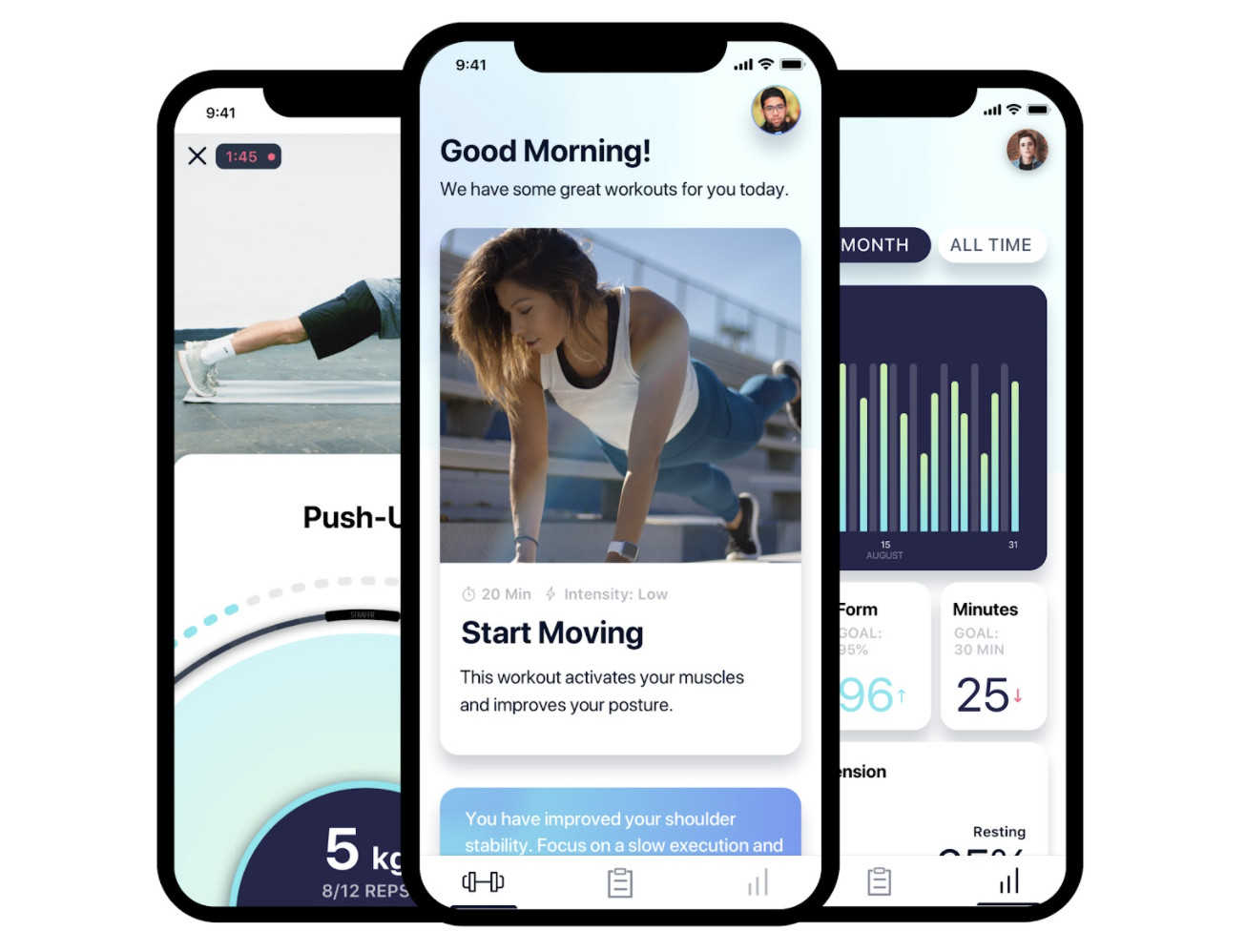Smart fitness gear is often limited by being static and non-portable. (And, well, eye-wateringly expensive.) Think Peloton‘s stationary bike for spin classes or wall-mounted strength training rig Tonal. Great if you’re at home and can afford to shell out thousands on a fancy home gym, but what if you want to take your workout with you wherever you go?
Meet Straffr, a German startup that’s exhibiting at the TechCrunch Disrupt Startup Alley this week. The company sells a smart fitness band that you can just pop in your backpack and take with you when you hit the road.
Originally opting for a crowdfunding route via Kickstarter last year, the hardware startup has gone on to sell “a few thousand” bands since getting the product to market in March this year. They’ve also bagged backing from business angels and have just closed a second seed round with an international investor as they gear up to expand their fledgling fitness business.
Straffr’s smart resistance band, which comes in either medium or strong strength grades, connects to the companion app using Bluetooth and starts tracking soon as you start stretching and flexing — providing feedback on your training session, not just on reps but on “quality” of exercise, per CEO Stefan Weiss.
The whole band is actually a sensor — made of an expandable rubber that’s electrically conductive. Straffr’s team developed the material and has some patents on it.
“It’s really hard to find and develop a material that stretches over 200% or 300% … and not break and not measure anything,” Weiss tells TechCrunch. “When you stretch [the Straffr fitness band] the electrical resistance changes and therefore we can say how much you’ve stretched the band for a specific exercise.”
Anyone who’s tried to do strength training using a (non-smart) resistance band knows it can be pretty tricky to keep focused and engaged without professional guidance. Basically it’s hard to know if you’re performing the movements in an optimal way or just mindlessly twanging a piece of rubber. So a sensing element looks like it could add a lot of value to this particular bit of fitness kit.
Straffr’s smart band clocks your reps, power and velocity as you pull, with the app providing real-time feedback through the workout — offering verbal cues if you’re pulling “too fast” or nudges to keep things “slow and even.” It’ll also show you overall results of the workout if you’re a fan of fitness stats.
The app features a selection of workout videos which let you follow along to pre-recorded fitness band sessions, such as HIIT-focused workouts, total body strength training or quick home-office exercises.

Image Credits: Straffr
Weiss says the startup is building a premium on-demand offer, too — and has recently onboarded five personal trainers so it can offer one-to-one training sessions. That will be for a future Pro feature. The basic app is free, as the startup is charging for the hardware.
Straffr’s band costs just over $100 (€99.99), which is very pricey if you’re comparing it to a non-smart alternative (a basic resistance band can cost just a few dollars). But that’s a fairly poor comparison, because here you’re getting a whole fitness package versus just a piece of elastic. So those extra dollars are for relevant exercise content and in-app personalization along with workout quantification and the added motivation of live feedback.
It’s also worth noting that Straffr’s smart band is considerably cheaper than shelling out for a Peloton or other high-end connected home-gym kit, which is now aiming to lighten people’s wallets by targeting their workouts.
So, seen from that perspective, Straffr’s spin on smart fitness kinda looks like a bargain.
Typical buyers so far tend to be either fitness-focused men who are very into the “quantified self” trend, per Weiss, or middle-aged women wanting an alternative to fitness classes at the gym. But a humble (but smart) fitness band really could offer something for everyone.
“Where really we see a future of training with resistance bands is with personal trainers directly,” Weiss adds. “One-on-one digital training, on-demand, with personal trainers, with pro athletes, with Olympians that talk you through the whole workout routine, what it does, they’re training with you, it’s sweaty training, it’s motivating for people.”
Still, if resistance band workouts really aren’t your jam, Straffr does have plans to develop additional bits of a smart fitness kit. Although Weiss won’t be drawn on exactly what other connected hardware they’re cooking up.
“We do have a product in the pipeline now that we’re developing internally right now — and we’re really excited about it,” he says, adding: “I can say it’s not going to be just a jumping rope which counts.
“For us it’s always the combination of functional, really portable training with the component of tracking quality — the quality of your training. Like how good are you? Are you actually effective? Because if you’re just counting reps and steps and stuff there’s obviously a good motivational aspect to it … but we want to also see are these reps really good, are they good quality, are you doing the best you can for the condition you’re in right now?”

